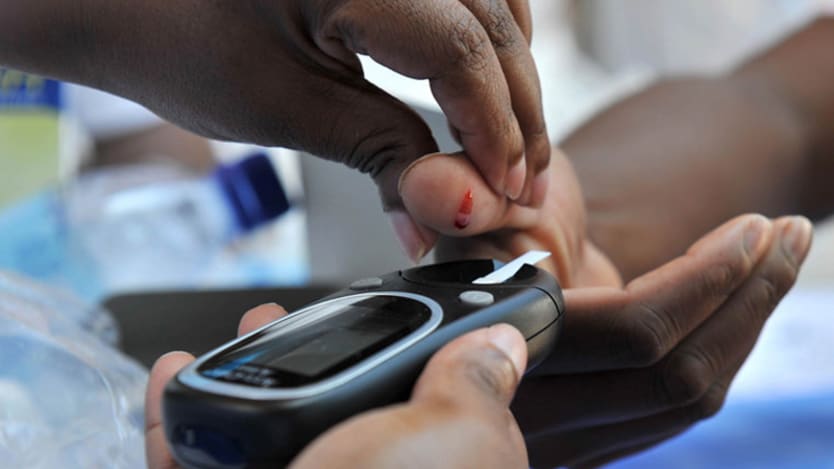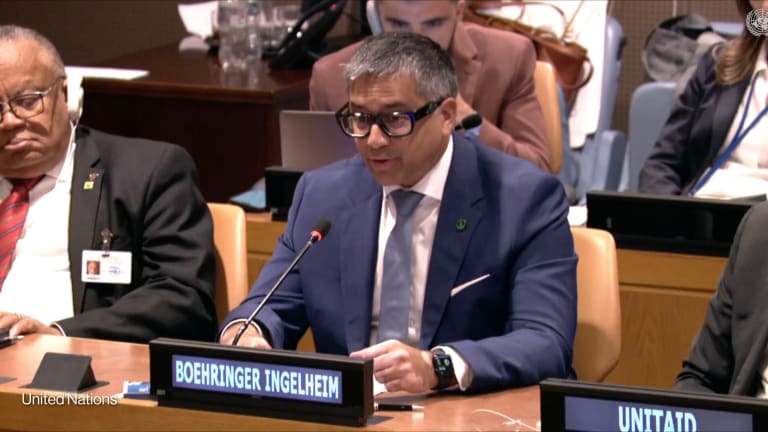
MANILA — Ever since the World Health Organization last year announced plans to create an independent high-level commission on noncommunicable diseases, the global health community has been waiting to learn more. Last week, Director-General Tedros Adhanom Ghebreyesus released the full composition of the global commission, a powerhouse cast of public and private sector leaders. The announcement has some feeling encouraged as they prepare for the third high-level meeting on NCDs, expected to be held in September. But it also raises questions of whether this meeting will at last prove a turning point, moving from declarations and acknowledgments to action — even as the burden of such diseases grows ever higher.
See more related topics:
► Advocates seek noncommunicable disease funding mechanisms
► An emerging strategy to tackle chronic disease
► New global obesity data: Which countries top the list?
► Opinion: World leaders are showing up to fight NCDs. Let's not get distracted.
Commission co-chairs include three presidents, Uruguay’s Tabaré Vázquez, Finland’s Sauli Niinistö, and Sri Lanka’s Maithripala Sirisena. Other notable commission members are former Botswana President Festus Gontebanye Mogae; Chilean President Michelle Bachelet; The Elders’ Graça Machel; billionaire philanthropist Michael Bloomberg, who is also WHO’s NCDs ambassador; former United States Centers for Disease Control and Prevention Director and now Resolve President and Chief Executive Officer Tom Frieden; and Alibaba founder and Chair Jack Ma.
The presence of high-profile individuals in the commission gives advocates hope that more heads of state will participate, not just health ministers. This will send a strong message of political commitment to reducing the burden of NCDs and gives advocates indications on where NCDs fall within the agenda of heads of states.
Previous meetings have been a disappointment to some NGO leaders.
“In 2014, at the second U.N. meeting on NCDs, not a single head of government or state showed up. If that isn’t a signal of political inertia, I don’t know what is,” NCD Alliance CEO Katie Dain wrote in a blog post in October.
Three years before that, the meeting was a “lost opportunity” in terms of galvanizing support toward the creation of a platform that would act as a dedicated fund financing NCDs work worldwide, according to Jose Luis Castro, president and CEO of Vital Strategies and executive director of the International Union Against Tuberculosis and Lung Disease.
“I think that was one of the lost opportunities back in 2011. When the United Nations convened the high-level meeting on AIDS, the Global Fund was created and countries have pledged to support the fund. So that was a major accomplishment,” he said. “However, that did not happen in the NCD meeting.”
He attributed this, most likely, to economies just starting to bounce back from the economic crisis of 2008-2009.
But he and others are hoping this meeting will be more than just a platform for empty declarations of concern.
“What we hope that this meeting accomplishes is that countries come prepared to show progress that has been made, and also make some solid political commitments, not just to make another declaration that this is a problem that needs to be addressed,” Castro said.
This, to Castro, means countries committing to, for example, addressing the issue of commercial products that create harm to health and taxing or regulating them, as well as actually setting a budget to address NCDs.
A strong political commitment at the highest level of government can help unlock financing for NCDs, said Castro, pointing to the case of the Philippines where a “sin tax” on tobacco and alcohol has been used to fund public health programs.
Amid such hopes, however, there is real cause for concern.
In 2017, a progress report revealed how “uneven and insufficient” countries’ progress have been in meeting globally agreed targets on NCDs. There are still a considerable number of countries that have not made much progress in developing their NCD national plans and targets.
NCDs also continue to receive little investment. While it’s difficult to assess how much money is actually being allotted for NCDs worldwide, given the different contexts in which funding is being disbursed and resources are being invested, some statistics provide stark figures. Organizations such as the Institute for Health Metrics and Evaluation has put the figure at less than 2 percent of international health assistance. NCDs remains the most underfunded program within WHO as well — under $400 million — based on the latest and available data in its budget portal.
Some also continue to perceive NCDs as a lifestyle disease that do not pose threats to countries’ national security, at least not directly.
“They are not,” Castro said. “I disagree with that, especially when we start looking at countries and see the number of obese people, of people who are obese and develop diabetes, and then shortly after they’ll have amputations. I think that’s a disaster looming.”
NCDs, according to WHO statistics, kill an estimated 40 million people worldwide, accounting for 70 percent of all deaths globally. Fifteen million of those deaths occur among those aged between 30 and 69 years old, covering mostly people of productive age.
Part of the agenda
Despite the momentum, most of what is to occur at the high-level meeting is still in discussion and preparatory stage, including the exact dates of the meeting.
But amid the uncertainties are some assurances.
The third high-level meeting will for the first time include mental health in the discussions, said Dr. Svetlana Axelrod, WHO assistant director-general for NCDs and mental health. And while it is not designed to be a pledging conference, Axelrod said issues on access to medicines and finance will be tackled by the high-level commissioners and likely inform the report they are expected to produce in time for the event.
In the lead-up to the meeting, WHO is also co-hosting with the government of Denmark a global financing dialogue for the prevention and control of NCDs, taking place from April 9-11 in Copenhagen. This, the assistant director-general said, will be attended by government representatives, civil society actors, and the private sector and help provide input into the high-level meeting.
“Of course one of the points to be discussed is mobilization of resources from different stakeholders. [In addition], we are inviting potential donors [but] as I said, we need to find the balance, because sometimes they are ready to give some additional money, but we want to understand how will it be realized and what kind of projects we can do together,” she said.
“As regards the medical access, it’s also important. As you know, we now have a new structure of the WHO and the new ADG for medicine access. We are discussing together and creating a common working group related to access to cancer drugs,” she added.
How many heads of state will attend is unclear at this point, but the assistant director-general said having a back-to-back high-level meeting on tuberculosis provides huge opportunities to achieve high attendance, and bring attention to both issues of communicable and noncommunicable diseases.
Whether any specific commitments will come out from the meeting remains to be seen. However, Axelrod said that they are suggesting governments pay more attention toward multisectoral collaboration.
“It’s important that all stakeholders will be involved in the process of implementing the NCD agenda in the countries, because now we see that we have some problems on how we will collaborate with the private sector, the pharma industry, and we have to raise this problem during the high-level meeting to see how we can find a good balance between our collaborations with the government, and other stakeholders,” she said.
The WHO director didn’t provide concrete examples of these collaboration challenges, but she said that the U.N. health aid agency is starting to explore this and find solutions.
“We have already created the FENSA [Framework of Engagement with Non-State Actors], and we have another global coordination mechanism, which is also geared toward this kind of discussion,” she said, noting they just need to explore further models of engagement with the private sector.








